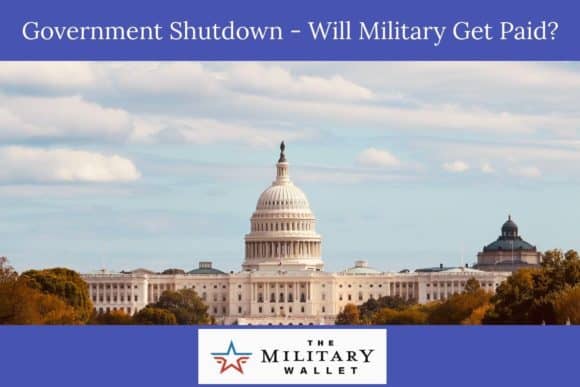Table of Contents
- Why Does the Government Shut Down?
- What Happens if the Government Shuts Down?
- Will Military Members Get Paid During a Government Shutdown?
- Most Recent Government Shutdowns and Impact on Military Pay & Benefits:
- Other Ways a Government Shutdown May Impact Pay & Benefits
- Will Federal Employees Get Paid During a Government Shutdown?
- Some government employees may not be required to report to work.
- Will Federal Employees Receive Back Pay?
- Can Federal Employees Claim Unemployment Benefits During a Furlough?
- How does a government shutdown impact non-DoD federal employees and military contractors?
- What Happens to Other Federal Benefits During a Government Shutdown?
- What About Military Health Care Benefits?
- What About Veterans Health Benefits?
- What About VA Disability Compensation?
- What about Social Security, Medicare, Medicaid, etc.?
- Lessons Learned from the Last Government Shutdown
- We Need to Take Control of Our Finances
- Stay Informed
- Bank with Someone Who Understands
- Take Control Where Possible
In what seems to be a recurring theme, the U.S. government is rushing up against the deadline to pass the spending bill to fund the government. This includes, among many other things, military operations.
The US government has experienced several shutdowns in recent memory, the most recent of which was a 35-day shutdown in 2018 that extended into early 2019.
How would a government shutdown affect the average American, and just as importantly, what would it mean for our men and women in uniform?
These are great questions. A government shutdown impacts a large segment of our population, including federal government employees and military members. But what about military retirees, Social Security Recipients, and recipients of other government and military benefits such as Tricare, VA benefits, and more? The answers to these questions vary, depending on several situations.
Why Does the Government Shut Down?
First, let’s start with a little background on the situation. The most common reason the U.S. government shuts down is for failing to pass an Appropriations Bill (essentially a budget). The next most common reason is the government runs up against its Debt Ceiling, which is its ability to borrow money. The inability to borrow money would prevent the government from making debt payments, causing it to default on its sovereign debt.
The US government is required to pass a spending bill each year. These appropriations bills can be equated to their budget. But the government also needs to pass an Authorization bill, to give the government the authority to spend the funds.
The military is funded through the National Defense Authorization Act or NDAA. The 2024 NDAA has been passed by Congress and received President Biden’s signature. In 2024, the law allocates $841.4 billion to the Defense Department and a 5.2% pay raise for military and civilian members of the department.
Note: The Appropriations and Authorizations are all based on the Fiscal Year.
The Federal Budget extends for the Fiscal Year, which begins on October 1st and expires each year on September 30th. Without passing a new spending bill, the government will essentially shut down. However, the government can pass a Continuing Resolution (CR), which allows the government to continue functioning for a certain amount of time.
Continuing resolutions are not automatic and must be voted on and passed before they can be enacted. These CRs also come with expiration dates. They can last anywhere from a few days to a few months. Sometimes, the continuing resolutions are extended, or new continuing resolutions are passed to buy more time.
What Happens if the Government Shuts Down?
Each government shutdown is slightly different. The Office of Management and Budget determines the exact government agencies a government shutdown will impact.
In general, emergency and essential services remain operational. This usually includes the military, air traffic controllers, Transportation Security Administration (TSA), federal law enforcement officers, and federally funded medical personnel.
However, it does not always include the entire Department of Defense workforce, including traditional members of the Guard or Reserves, dual-status technicians, and many others.
In some instances, Congress passed emergency funding bills to keep certain government organizations operational while other parts of the government were temporarily shut down. This emergency funding included military pay and benefits in some years, while others did not.
We can’t tell you for certain how any given shutdown will impact government or military operations because each situation is unique. But we can give you some examples from recent years.
Will Military Members Get Paid During a Government Shutdown?
The most recent government shutdown in 2018 – 2019 did not cause Department of Defense (DoD) members to miss a paycheck. This means that all military members, retirees, annuitants (survivor benefit recipients), and DoD civilian employees who fall under the DoD received their normal paychecks.
However, other members of the Uniformed Services that do not fall under the DoD were not funded under those government spending bills. That means members of the following organizations went without pay until the government shutdown was over:
- The US Coast Guard (USCG), which falls under the Department of Homeland Security,
- The National Oceanic and Atmospheric Administration (NOAA), which falls under the United States Department of Commerce, and
- The Commissioned Corps of the US Public Health Service (USPHS) which is a division of the Department of Health and Human Services concerned with public health.
The 2018-2019 government shutdown also saw the cancellation of many Guard and Reserve drill periods. Many civilian members who support the Guard and Reserves were also furloughed during this period.
Most Recent Government Shutdowns and Impact on Military Pay & Benefits:
Thankfully, most military members were paid during the most recent government shutdown. However, military members have missed paychecks in some previous government shutdowns.
Here is a recent history of how government shutdowns impacted military pay and compensation:
| Government Shutdown Dates | Shutdown Duration | Was Military Pay Impacted? |
|---|---|---|
| December 2018–January 2019 | 35 Days | – DoD members received full pay and benefits. – Most Guard & Reserve units cancelled training and many DoD civilians were furloughed. – Uniformed Servicemembers not in the DoD were impacted (USCG, NOAA, USPHS). |
| Jan 20 – Jan 22, 2018 | 3 Days | No impact to military pay. |
| 2013 | 16 Days | – Military pay was not impacted. However, DoD civilians and many dual-status technicians were furloughed. – Furloughed employees eventually received back pay. |
| Nov 14 – Nov 19, 1995, and Dec16, 1995, to Jan 6, 1996 | 5 Days, and 21 Days | – Military pay was delayed. |
Other Ways a Government Shutdown May Impact Pay & Benefits
There is a difference between a full and partial government shutdown.
In a full government shutdown, it is possible that military members may not receive their full pay and benefits such as BAH and BAS. However, other benefits, such as health care, would generally be available.
When the DoD is fully funded before the shutdown, or if there is a partial government shutdown, there may be no impact on your military compensation, including your base pay or other benefits such as your BAS and BAH.
Again, this may apply differently to members of different organizations. Check with your parent government organization for further clarification.
Can I Take Leave During a Government Shutdown? In previous government shutdowns, military members were forced to cancel leave because, technically, the government is not allowed to permit government workers to take paid leave while there is no spending plan due to the way paid leave works from an accounting standpoint.

Check your VA Home Loan eligibility and get personalized rates. Answer a few questions and we'll connect you with a trusted VA lender to answer any questions you have about the VA loan program.
Will Federal Employees Get Paid During a Government Shutdown?
As mentioned above, some essential and emergency government personnel are exempt from government shutdowns. However, shutdowns can still greatly impact the federal employee population. For example, during the 2018-2019 government shutdown, approximately 25% of federal employees, or an estimated 800,000 individuals, went without pay.
To add insult to injury, almost half of the 800,000 employees who weren’t being paid were still required to attend work. The remaining members were furloughed, which means they still have their job, but they aren’t required to report to work. And none of them were being paid while on furlough.
Some government employees may not be required to report to work.
If a funding bill is not passed, most government employees will be temporarily furloughed and will not be required to work until a spending bill is passed. However, there are exemptions, especially for those whose work is required for national security, including most military members.
In previous shutdowns, some military members were not required to report to work. These groups of military members will be broken into exempt and non-exempt categories. So operations in war zones, humanitarian relief, and many people involved in critical fields including medical, security, and transportation will continue to work.
Will Federal Employees Receive Back Pay?
Congress has authorized back pay after some previous government shutdowns. And there is every indication that will be the case this time around. However, that doesn’t do much for those federal employees who aren’t currently being paid for their work or forced time away from work.
Can Federal Employees Claim Unemployment Benefits During a Furlough?
Yes, most states will allow furloughed government employees to claim unemployment benefits. However, most states will also require the unemployment benefits recipients to repay the benefits if they later receive back pay from the government. So this may not be the best option if it causes you to accrue debt to your state employment office or bureau.
More tips on how to deal with the government shutdown.
How does a government shutdown impact non-DoD federal employees and military contractors?
Many other government civilians will not receive pay during the shutdown, and many government and military support facilities will be closed. Check with your base for a list of current closings.
A government shutdown may also impact some government contracts if the contractors cannot access government facilities or perform their contracted duties.
What Happens to Other Federal Benefits During a Government Shutdown?
Note: The following types of payments are generally safe during a government shutdown:
- Military Retirement Pay
- GI Bill benefits
- VA Disability Compensation & VA Health Care
- Social Security benefits
- Medicare and Medicaid
The government shutdown will only affect paychecks for government spending, which must be approved annually. Some military-related payments are made from a separate pot of money and likely won’t be affected. The following payments are expected to continue without interruption during a government shutdown:
- Military retiree pay
- GI Bill benefits
- Veterans receiving monthly disability and compensation payments
What About Military Health Care Benefits?
Military healthcare benefits should continue during a government shutdown. DoD medical and dental care facilities will remain operational and will continue inpatient and outpatient care during a government shutdown.
What About Veterans Health Benefits?
VA healthcare facilities will remain operational. However, some VA medical professionals who do not work directly with patients may be furloughed. This can include those involved with research or non-critical tasks.
What About VA Disability Compensation?
VA disability compensation should continue during a government shutdown, at least for the foreseeable future. During the 2013 shutdown, VA officials warned of the potential for VA disability compensation delays if the government shutdown dragged on for several weeks.
What about Social Security, Medicare, Medicaid, etc.?
Certain mandatory, non-discretionary, and entitlement payments are unaffected. This means the government will continue sending Social Security Benefits to recipients.
Medicare, Medicaid, and VA health care benefits would continue during a shutdown, but payments for the care may be later than normal. So be aware of this when planning any non-emergency or low-priority medical care. Also, note that many non-emergency veteran healthcare services were curtailed during previous government shutdowns.
Lessons Learned from the Last Government Shutdown
The last government shutdown affected just about everyone in some way. And for many of us, it was scary. Would we get paid? Would veterans benefits continue?
The answers changed depending on the day of the week. Until laws were changed, no one would get paid. Congress eventually passed a law that ensured active duty military members would get paid, but many non-military government employees were furloughed without pay (many of them will get back pay, but that doesn’t account for the problems many people incurred while they were without pay).
There were other problems:
Many members of the Guard and Reserves had their drills canceled, reducing their points for the year, and leaving them without their expected drill pay.
Numerous base activities and benefits were temporarily canceled or shut down. The Commissary, base exchange, child care, and other base benefits were unavailable.
In short, it was a bad dream for most military members and government employees. And here is the worst part: it can, and likely will, happen again.
Like the last few times dealing with the debt ceiling, the government placed a band-aid on the wound. They didn’t make a permanent fix. This has been going on for the last two years and will likely continue unless the government passes a permanent solution.
In the meantime, it is up to all of us to do as much as possible to take control of our lives. Here are some tips we can all use to get on a better financial footing so the next time something like this happens it will still be an inconvenience, but hopefully, it won’t be catastrophic.
We Need to Take Control of Our Finances
It is hard to be in control when you are in the military. You go where they tell you to go, you get paid when the government says you get paid, etc. I get that. But there are things we can all do to help ourselves be in more control of our financial lives.
It starts with our day-to-day and week-to-week living. Living paycheck to paycheck is tough; for many, it is a reality. But we all need to try to get ahead of the paycheck game. (Yes, I know it is hard to live on an enlisted salary, but tens of thousands of military families do it daily).
Getting out of the paycheck-to-paycheck cycle: There are no secrets here. The only way to get out of the paycheck-to-paycheck cycle is to spend less than you earn (or earn more than you spend). It won’t happen any other way. Here are some recommended tips to get you started:
Build an emergency fund
An emergency fund is a savings account you set up for a rainy day. You don’t touch it unless you absolutely need to. There is no magic number for how much money you need in your emergency fund, but a recommended starting point is $1,000 (you don’t have to stop there; just set that as a target to get started). That is a lot of money, but you don’t have to put it all in immediately. Start saving $25 a week, or $50 a paycheck, or whatever you can afford to put away. The money in your emergency fund will help you deal with unexpected expenses, such as a flight home, a car accident, or a government shutdown. Your emergency fund will help you avoid relying upon credit cards or other loans in an emergency.
Reduce your debt
Debt is nothing but an anchor to your financial growth. It is hard to cut back your spending when you have a large portion of your income tied up in monthly payments. Every bit of debt you reduce now is less money you have to spend before it hits your bank account, making it easier to weather the storm of a government shutdown or other event that limits your cash flow.
Increase income
Increasing your income is a great way to supercharge your savings or reduce the time you take to get out of debt. Not everyone can work part-time when in the military (and most military members shouldn’t). But there are other ways to earn more money, including having a side business, or a hobby that can generate income. Spouses may also be able to work part-time, either in or out of the home. Any additional income can make cash flow problems easier to deal with.
Stay Informed
The government shutdown was not a static event. There was news about it in the weeks leading up to it, and a constant news stream during the shutdown. There was no permanent solution, so it is very possible this can happen again. Be ready if it does. If you see anything about this in the news, start preparing as soon as possible. Cut expenses where possible, save what you can, encourage your spouse to look for part-time work if possible, etc. Look at your personal situation and adjust as necessary. Preparing even a month out can reduce your stress levels.
Bank with Someone Who Understands
I recommend banking with a military financial institution such as Navy Federal Credit Union, Pentagon Federal Credit Union, or United Services Automobile Association (USAA). (There are likely other good financial institutions out there, I am recommending the ones I am most familiar with).
All of these financial institutions are built to serve their members first, not shareholders like corporate banks. (Credit Unions, by definition, are owned by their members, and USAA is under a unique charter; they too are owned by their members).
Because of these differences, these financial institutions are able to do things for their members that other financial institutions won’t do, such as offer low-interest or interest-free loans during a government shutdown. They may also offer other forms of assistance to help members get through a difficult period. These organizations sometimes offer additional member benefits during a PCS or deployment, better customer service than most large commercial banks, better financial products, fewer fees, and more. I recommend looking into joining one of these institutions if you aren’t already a member.
Take Control Where Possible
At the end of the day, the government shutdown was a major inconvenience for many people. And that is unfortunate because the shutdown harmed the people the government is supposed to protect. That makes for an eye-opening experience for many of us. For me, it reinforced that I need to take as much control into my hands as possible.
Note: Here are some tips for Dealing With a Missed Military Paycheck. These tips can show you how to get by on your own or how to contact your lender, landlord, or financial aid service to get help with this situation




Comments:
About the comments on this site:
These responses are not provided or commissioned by the bank advertiser. Responses have not been reviewed, approved or otherwise endorsed by the bank advertiser. It is not the bank advertiser’s responsibility to ensure all posts and/or questions are answered.
Danielle says
This article is wrong. Not all branches of the military are being paid during the 2018-2019 shutdown. Yes Department of Denfense is funded, but the Men and Women of the U.S. Coast Guard are not. Even though they are under the Department of Homeland Security, they are designated as an armed force/ branch of the military in 14 U.S. Code § 1. They missed their first paycheck this morning.
Ryan Guina says
Hello Danielle, You are correct, the Coast Guard is a military branch. It operates under the U.S. Department of Homeland Security during peacetime, which is where they get their funding.
There are several uniformed services with the same pay scales as the US military.
These include the Coast Guard (USCG), which falls under the Department of Homeland Security, the National Oceanic and Atmospheric Administration (NOAA), which falls under the United States Department of Commerce, and the Commissioned Corps of the US Public Health Service (USPHS) which is a division of the Department of Health and Human Services concerned with public health.
Doc says
This is a sad day in this country when the people that serve to defend our way of life have to worry about how and if the love ones are good to go. This needs to stop and now…………..
kenneth smith says
What if we veterans and our service persons just say no and don’t work for our gov. in any thing they want us to do? We can go and stop our own gov to force them to pay us all. I will not use the new haelth care service coming in Oct-2013 or use it in Jan-2014. I will force them to pay me and we can all do this fight.